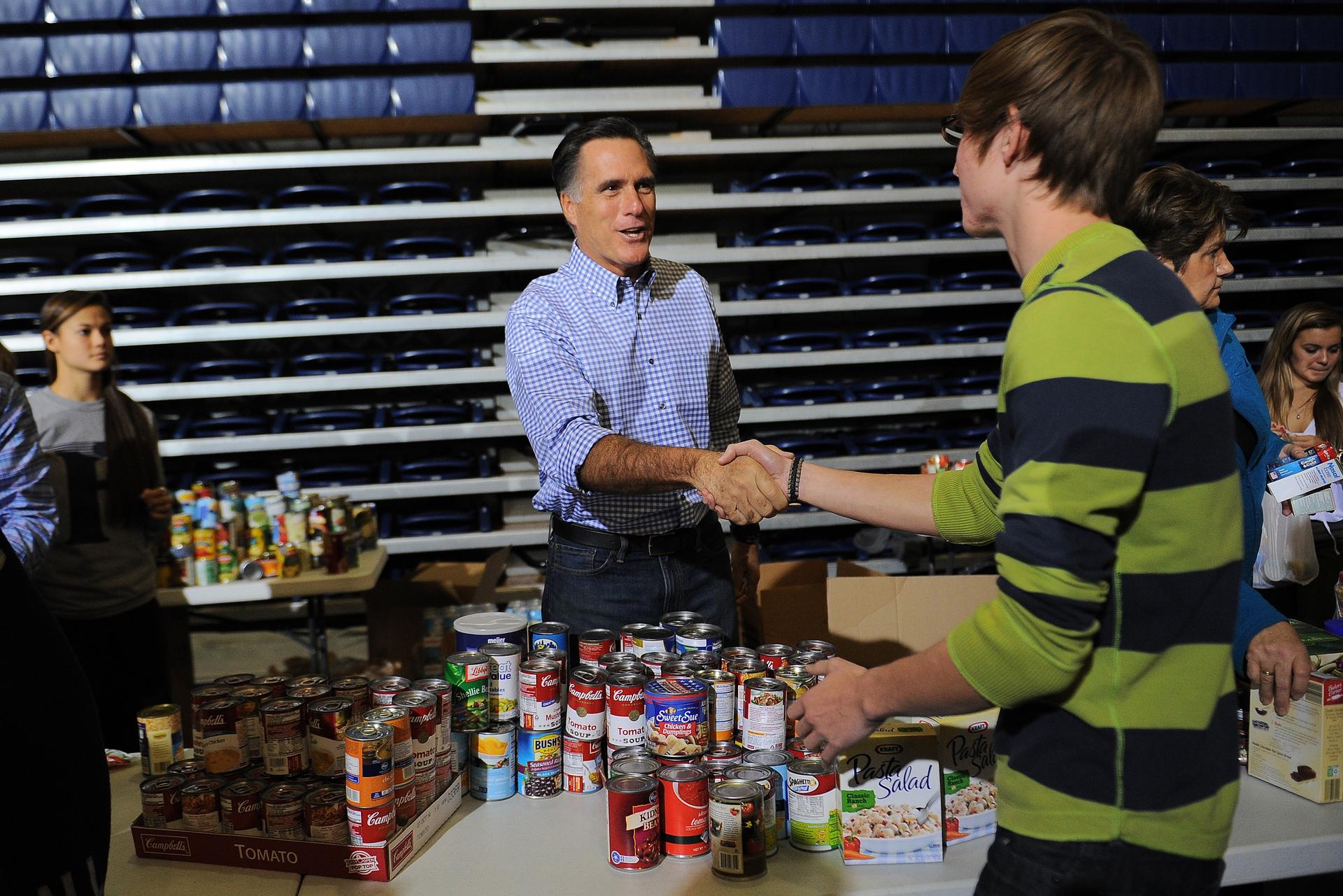Romney shows how NOT to help during a disaster
US Republican presidential candidate Mitt Romney helps collect and pack donated goods at a storm relief event to help people who suffered from superstorm Sandy, in Kettering, Ohio, on Oct. 30, 2012.
BOSTON — Winning the presidency is primarily a matter of optics.
And at the climax of the 2012 presidential campaign, Superstorm Sandy poses real image challenges for Mitt Romney, as the president grabs the spotlight in the relief efforts.
The Romney campaign has responded by seeking to show their candidate doing his part to aid victims. His first post-Sandy photo: collecting canned goods for evacuees. Sleeves rolled up, Romney glad-hands a volunteer in front of a folding table piled two rows high with Campbell's soup.
The image may convince some voters, even as news leaks that the donations were staged via a Wal-Mart run by campaign staff.
To others, it’s evidence of a candidate out of touch with the depths of the crisis. Queens had burned, nuke plants were on alert, and water had poured into the Battery tunnel. Now here’s Mitt Romney, ready to deliver the cream of chicken.
As any seasoned emergency relief professional will tell you, the last thing needed at a disaster site is thousands of boxes from small donors. Charities won’t tell you this. They’re in the business of letting people express their compassion, and they don’t want to alienate donors. But care packages and can drives are a terminal headache for their foot soldiers.
Consider this: The donations collected at the Romney event included diapers, toothbrushes, mini-deodorants, cereal, toilet paper and fleece blankets, according to the Washington Post. These will be shipped in, somewhere, on damaged infrastructure. (In Ohio, Romney didn’t know for sure where the items would go: “We’re going to box these things up in just a minute and put them on some trucks, and then we’re going to send them into, I think it’s New Jersey,” he said.)
And they will be accompanied by countless other boxes — of clothing, tampons, pharmaceuticals (expired drugs and half-used prescriptions are always popular), and the like.
Such items barrel in like flotsam after pretty much any disaster, domestic or foreign.
They merely add to the debris.
Storing, sorting and moving them to actual recipients is logistical hell, and a serious burden for already-overstretched relief workers.
Local food banks and soup kitchens might be setup to handle small donations. Disaster areas are not.
Often, such donations merely go to waste.
In one extreme example, after the 2004 Indian Ocean tsunami, pharmaceuticals sent from around the world clogged the airport. So they were shipped by the truckload to a warehouse, where they eventually rotted in their boxes, seeping into the groundwater and creating a biological hazard that loomed for years after the disaster.
That’s not to say that you shouldn’t support private organizations. You should — the good ones play a critical role globally, alongside government relief agencies.
Donate to a reputable relief organization. And politically, don’t be fooled by the idea that citizen goodwill can replace the work of real professionals.
The damage from Hurricane Sandy is estimated at more than $20 billion. As GlobalPost's Jean MacKenzie points out, that's a lot of canned goods and toilet paper.
An event like Sandy is an opportunity for presidential candidates to demonstrate leadership and good judgment.
Romney fell short on that.
By highlighting private charity in his Ohio event, Romney underscored the post-Reagan Republican fantasy that churches and civic groups can easily replace "useless government bureaucrats." And he appears to be making good on his 2011 comments, in which he argued that the federal government had no business supporting emergency relief — in fact, it could no longer afford to do so.
Shutting down FEMA won’t happen, because it would amount to political suicide the next time disaster strikes. But if elected, don't be surprised if Mitt follows President George W. Bush’s lead and recruits a FEMA chief from the International Arabian Horse Association.
Follow journalist David Case on Twitter: Follow @DCaseGP
Our coverage reaches millions each week, but only a small fraction of listeners contribute to sustain our program. We still need 224 more people to donate $100 or $10/monthly to unlock our $67,000 match. Will you help us get there today?
